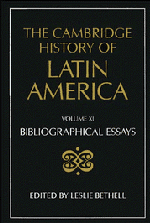Book contents
- Frontmatter
- I THE INDIGENOUS PEOPLES OF MIDDLE AND SOUTH AMERICA ON THE EVE OF THE CONQUEST
- II COLONIAL SPANISH AMERICA
- III COLONIAL BRAZIL
- IV THE INDEPENDENCE OF LATIN AMERICA
- V LATIN AMERICA: ECONOMY, SOCIETY, POLITICS, c. 1820 TO c. 1870
- 1 Post-independence Spanish America: Economy and society
- 2 Post-independence Spanish America: Society and politics
- 3 Mexico
- 4 Central America
- 5 Haiti and the Dominican Republic
- 6 Cuba, c. 1760–c.1860
- 7 Venezuela, Colombia and Ecuador
- 8 Peru and Bolivia
- 9 Chile
- 10 The River Plate republics
- 11 Brazil, 1822–1850
- 12 Brazil, 1850–1870
- VI LATIN AMERICA: ECONOMY, SOCIETY, POLITICS, c. 1870 to 1930
- VII LATIN AMERICA: ECONOMY, SOCIETY, POLITICS, 1930 to c. 1990
- VIII IDEAS IN LATIN AMERICA SINCE INDEPENDENCE
- IX LATIN AMERICAN CULTURE SINCE INDEPENDENCE
- X THE INTERNATIONAL RELATIONS OF LATIN AMERICA SINCE INDEPENDENCE
- THE CAMBRIDGE HISTORY OF LATIN AMERICA
4 - Central America
from V - LATIN AMERICA: ECONOMY, SOCIETY, POLITICS, c. 1820 TO c. 1870
Published online by Cambridge University Press: 28 March 2008
- Frontmatter
- I THE INDIGENOUS PEOPLES OF MIDDLE AND SOUTH AMERICA ON THE EVE OF THE CONQUEST
- II COLONIAL SPANISH AMERICA
- III COLONIAL BRAZIL
- IV THE INDEPENDENCE OF LATIN AMERICA
- V LATIN AMERICA: ECONOMY, SOCIETY, POLITICS, c. 1820 TO c. 1870
- 1 Post-independence Spanish America: Economy and society
- 2 Post-independence Spanish America: Society and politics
- 3 Mexico
- 4 Central America
- 5 Haiti and the Dominican Republic
- 6 Cuba, c. 1760–c.1860
- 7 Venezuela, Colombia and Ecuador
- 8 Peru and Bolivia
- 9 Chile
- 10 The River Plate republics
- 11 Brazil, 1822–1850
- 12 Brazil, 1850–1870
- VI LATIN AMERICA: ECONOMY, SOCIETY, POLITICS, c. 1870 to 1930
- VII LATIN AMERICA: ECONOMY, SOCIETY, POLITICS, 1930 to c. 1990
- VIII IDEAS IN LATIN AMERICA SINCE INDEPENDENCE
- IX LATIN AMERICAN CULTURE SINCE INDEPENDENCE
- X THE INTERNATIONAL RELATIONS OF LATIN AMERICA SINCE INDEPENDENCE
- THE CAMBRIDGE HISTORY OF LATIN AMERICA
Summary
A comparison of Lázaro Lamadrid, ‘A survey of the historiography of Guatemala since 1821: Part I – The nineteenth century’, TA, 8/2 (1951), 189–202; W. J. Griffith, ‘The historiography of Central America since 1830’, HAHR, 40/4 (1960), 548–69; and R. L. Woodward, Jr., ‘The historiography of modern Central America since 1960’, HAHR, 67/3 (1987), 461–96, reflects the rapid growth of historical publication on Central America in the second half of the twentieth century. For publications since c. 1970 in particular, see the extensive bibliographical essay in R. L. Woodward, Jr., Central America, a Nation Divided, 2nd ed. (New York, 1985), 278–312.
While earlier general works continue to have utility, Woodward, Central America, Ciro Cardoso and Héctor Pérez, Centroamérica y la economía occidental (1530–1930) (San José, C.R., 1977), and James Dunkerley, Power in the Isthmus: A Political History of Modern Central America (London, 1988) incorporate much of the recent scholarship on the first half-century of independence. Edelberto Torres Rivas, Interpretatión del desarrollo social centroamericano (San José, C.R., 1971) has provided much of the inspiration for serious recent historical research in the social sciences in Central America. Histories of individual states that reflect recent scholarship on the nineteenth century include Narda Dobson, A History of Belize (London, 1973); O. N. Bolland, The Formation of a Colonial Society: Belize from Conquest to Crown Colony (Baltimore, 1977); Héctor Lindo–Fuentes, Weak Foundations: The Economy of El Salvador in the Nineteenth Century, 1821–1898 (Berkeley, 1991); David Luna, Manual de historia económica (San Salvador, 1971); and E. Bradford Burns, Patriarch and Folk: The Emergence of Nicaragua, 1798–1858 (Cambridge, Mass., 1991).
- Type
- Chapter
- Information
- The Cambridge History of Latin America , pp. 264 - 270Publisher: Cambridge University PressPrint publication year: 1995



